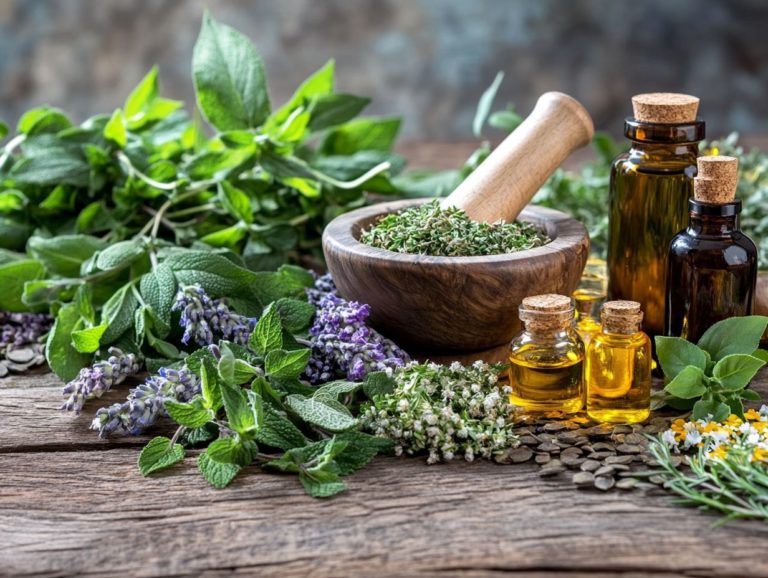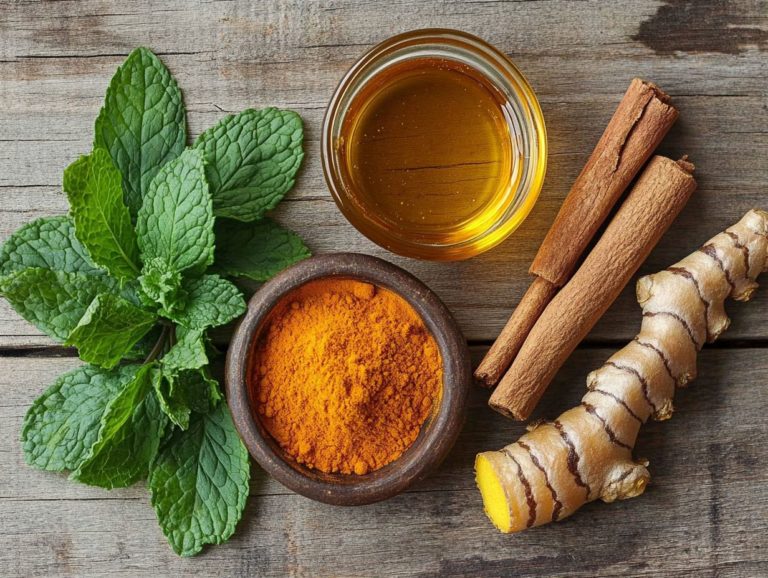What Are Common Myths About Herbal Remedies?
Herbal remedies are increasingly popular as natural alternatives to conventional medicine.
They offer various health benefits that many find appealing.
However, misconceptions linger, creating a cloud of confusion regarding their safety and effectiveness. This article aims to clarify what herbal remedies truly are, debunk prevalent myths, and delve into both their advantages and potential risks, including the common myths surrounding herbal preparations.
You will find practical tips on how to safely incorporate herbal remedies into your healthcare routine. This will empower you to make informed decisions that enhance your well-being through herbalist guidance and mindfulness meditation.
Contents
- Key Takeaways:
- Understanding Herbal Remedies
- Common Myths About Herbal Remedies
- Benefits and Risks of Herbal Remedies
- How to Incorporate Herbal Remedies into Your Healthcare Routine
- Proper Dosage and Usage Guidelines
- Frequently Asked Questions
- What do people often get wrong about herbal remedies?
- Do herbal remedies have no side effects?
- Are herbal remedies not as effective as conventional medicine?
- Can herbal remedies be used as a substitute for prescribed medication?
- Are all herbal remedies safe for pregnant women?
- Do all herbal remedies come with a money-back guarantee?
- Can herbal remedies cure any and all health conditions?
Key Takeaways:

Remember: Not all herbal remedies are safe. Always consult a qualified herbal practitioner before use!
Herbal options shouldn’t replace conventional medicine for serious illnesses.
Stick to proper dosages for safe use.
Understanding Herbal Remedies
Understanding herbal remedies requires you to explore the rich tradition of herbal medicine. This practice has been embraced for centuries across diverse cultures for its remarkable healing properties, often derived from medicinal plants. These natural solutions, sourced from medicinal plants, are thought to enhance overall health by bolstering the immune system through the use of plant extracts and addressing chronic conditions.
Herbal remedies include a variety of preparations, such as herbal tinctures, herbal teas, and capsules. Each offers its own distinct health benefits and applications. Today, herbalism is evolving, connecting ancient wisdom with contemporary scientific evidence for herbal remedies. This exploration of pharmacological pathways provides effective treatment options for those seeking alternatives to conventional medications.
What are Herbal Remedies?
Herbal remedies are your gateway to natural wellness. Crafted from plant extracts, dietary supplements, and medicinal plants, they are designed to promote health and address various ailments.
These remedies often act as dietary supplements, delivering essential nutrients and bioactive compounds that can significantly enhance your overall well-being and general health. Unlike traditional pharmaceuticals, which typically target symptomatic relief using synthetic chemicals, herbal solutions tap into the profound wisdom of nature. They offer a holistic approach to health management. For example, sipping on herbal teas can support digestion, while herbal tinctures might bolster your immune function and provide stress reduction. To learn more about these options, check out what are the most common herbal remedies.
Common herbal options like echinacea, ginseng, and turmeric (curcumin) are not only versatile in their uses but also highly sought after by those eager for alternatives to conventional medicine. They resonate particularly well with individuals looking for natural methods, including energy healing, to maintain and nourish their health.
Common Myths About Herbal Remedies
Despite the increasing allure of herbal remedies, you ll encounter several pervasive myths, including those related to the effectiveness of homeopathy. These could lead you astray in your pursuit of alternative health solutions. Many people assume that these natural options are universally safe. However, this notion often neglects the critical importance of consulting a qualified herbal practitioner to ensure patient safety.
Such experts can navigate the intricacies of contraindications and interactions with traditional medicines that use synthetic drugs, ensuring that you are informed about potential costs associated with these remedies. The scientific backing for herbal remedies can be quite varied, so it s essential to approach these claims with a discerning eye. This is especially true when considering their effectiveness for chronic conditions and understanding the placebo effects that may arise.
Take charge of your health! Consult a qualified herbal practitioner today.
Myth 1: Herbal Remedies Are Generally Safe
One common myth suggests that herbal remedies are generally safe for everyone. However, this notion can be misleading, as individual responses vary widely.
Understanding patient safety is vital when it comes to herbal remedies. These natural treatments can interact with other medications and health conditions in unexpected ways. Therefore, it’s essential to know the healing properties and formulations of herbs. Some individuals might experience adverse reactions or find that a remedy isn’t effective due to interactions with their unique health profiles. To clear up any confusion, it’s helpful to explore 5 myths about herbal dosage debunked. Consulting with a qualified herbal practitioner is important for making safer choices regarding herbal solutions.
When you seek guidance from a qualified herbal practitioner, you can gain tailored insights that align with your specific health needs. This approach will help you make informed decisions about your herbal use while minimizing risks and maximizing potential benefits.
Myth 2: Herbal Remedies Are Not Effective

Another common misconception is that herbal remedies lack effectiveness, overlooking the significance of clinical trials conducted on certain herbal preparations. This perspective ignores the mounting scientific evidence that supports their effectiveness in treatment.
Numerous studies have highlighted the therapeutic properties of various herbs, such as Ginkgo biloba, showing that they can significantly contribute to wellness and disease management, especially in cognitive decline. Researchers find compounds in plants that display anti-inflammatory, antioxidant, and antimicrobial properties, challenging the notion that only synthetic drugs can offer relief.
While some argue that the placebo effects account for the benefits perceived from herbal treatments, it s essential to recognize that the physiological responses triggered by these remedies can also be supported by scientific evidence. This viewpoint encourages considering herbal solutions alongside traditional methods, such as homeopathy and mindfulness meditation, promoting a more holistic approach to health.
Myth 3: Herbal Remedies Are Only for Minor Ailments
One prevalent myth claims that herbal remedies are only effective for minor ailments. In reality, many powerful herbs can tackle chronic conditions with impressive results!
An expanding body of research indicates that nature-derived remedies, including herbal formulations, can offer amazing relief for persistent health issues like arthritis, diabetes, and hypertension, thanks to their healing properties. For example, turmeric, known for its anti-inflammatory effects, features the active compound turmeric curcumin, which is frequently used to manage joint pain.
Additionally, cinnamon shows promise in regulating blood sugar levels, making it a vital ally for anyone dealing with diabetes. Garlic supplements are also recognized for their immune-boosting qualities. Then there’s ashwagandha, celebrated for its stress-relieving benefits, which can be transformative for those experiencing chronic stress and anxiety symptoms.
These examples demonstrate that herbal solutions extend far beyond mere fixes for occasional headaches or colds; they possess significant potential in holistic health, offering effective treatment options for a variety of chronic conditions. To understand more about proper usage, consider the 5 popular misconceptions about herbal dosage and consult a practitioner for tailored advice!
Myth 4: Herbal Remedies Are Not Regulated by the FDA
Many believe herbal remedies operate outside FDA regulation. This leads to confusion about their safety compared to conventional medicines.
This perception divides how we evaluate natural products and traditional drugs. Allopathic medications undergo extensive testing, ensuring safety and effectiveness.
Unfortunately, herbal remedies often lack similar oversight. This inconsistency can put you at risk due to varying dosages and limited scientific evidence.
Understanding the regulatory landscape is vital. Identify reliable resources like clinical trials and scholarly articles to learn more about the safety of herbs.
Benefits and Risks of Herbal Remedies
Exploring the benefits and risks of herbal remedies is crucial for informed health decisions. Weigh the benefits against potential side effects.
Benefits of Using Herbal Remedies
The health benefits of herbal remedies can be remarkable. They tap into the healing powers of medicinal plants to boost wellness.
For example, chamomile is known for its soothing properties. It eases anxiety and promotes restful sleep.
Turmeric contains curcumin, a powerful anti-inflammatory. It helps relieve joint pain associated with chronic conditions.
Garlic is celebrated for its immune-boosting qualities. Garlic supplements can help you fend off common illnesses.
By adding these natural remedies to your routine, you can improve both physical health and emotional balance. Embrace a more holistic approach!
Risks and Precautions to Consider

While herbal remedies offer benefits, be aware of the risks they pose. Understanding how they interact with conventional medications is crucial for your safety.
Herbal treatments can interact negatively with prescribed medications. Consult qualified herbal practitioners to avoid complications.
Always talk to healthcare professionals before starting a new herbal regimen. Understanding the potential costs and benefits is important.
Informed usage is essential. Professional guidance helps you navigate the complexities of herbal solutions safely.
How to Incorporate Herbal Remedies into Your Healthcare Routine
Incorporating herbal remedies can enhance your well-being. Approach this with careful planning and consultation with a qualified herbal practitioner.
This ensures you use the right herbs in the correct dosages for maximum benefit.
Consulting with a Healthcare Provider
Consulting with a healthcare provider is an essential step when looking to integrate herbal remedies into your health regimen. This ensures that you prioritize both safety and efficacy.
These qualified practitioners have the expertise to assess your unique health profile and identify any potential drug interactions that might arise from mixing herbal treatments with conventional medications. Their expertise helps you find the right dosages and timings. This minimizes risks and promotes optimal health outcomes.
Healthcare providers can also guide you on how specific herbs may enhance or interfere with your existing treatments, fostering a working together approach to your wellness. This consultation supports your safety. It also empowers you to make informed decisions about your holistic health journey.
Proper Dosage and Usage Guidelines
Getting the right dosage and usage guidelines is crucial for your success!
If you’re considering adding these supplements to your health routine, keep in mind that individual needs can vary significantly based on factors like age, weight, health status, and any medications you may be taking. What are herbal remedies? While natural, they can deliver potent effects and potential interactions. Therefore, consulting with a healthcare professional who can provide personalized recommendations is critical.
They can help you determine the right dosage, discuss the best timing for consumption, and highlight any possible side effects. By tailoring your approach, you can enhance the effectiveness of these dietary supplements, ensuring a safer and more beneficial experience.
Frequently Asked Questions
What do people often get wrong about herbal remedies?

There are many misconceptions surrounding herbal remedies. Here are some common myths and the truth behind them.
Do herbal remedies have no side effects?
Many believe herbal remedies are completely safe. Like any medication, herbal remedies can cause side effects.
Are herbal remedies not as effective as conventional medicine?
Some believe that herbal remedies are not as effective as conventional medicine. While it is true that not all herbal remedies have been scientifically proven to work, many have been used for centuries and have shown positive results. It is important to do thorough research and consult with a healthcare professional before trying any herbal remedy.
Can herbal remedies be used as a substitute for prescribed medication?
This is a common misconception among those who prefer natural remedies. While herbal remedies can sometimes be used in conjunction with prescribed medication, they should not be used as a substitute without consulting with a healthcare professional. Some herbal remedies may interact with certain medications and cause adverse effects.
Are all herbal remedies safe for pregnant women?
Many people believe that all herbal remedies are safe for pregnant women since they are natural. However, some herbal remedies can have harmful effects on pregnancy and should be avoided. It is important for pregnant women to consult with their healthcare provider before trying any herbal remedy.
Do all herbal remedies come with a money-back guarantee?
It is a common myth that all herbal remedies come with a money-back guarantee. While some companies may offer this, it does not ensure that the product is safe or effective. It is important to do thorough research and only purchase herbal remedies from reputable sources.
Can herbal remedies cure any and all health conditions?
Many believe that herbal remedies can cure any health condition. While some herbal remedies may have beneficial effects on certain conditions, they are not a cure-all. It is important to consult with a healthcare professional and follow their recommended treatment plan.






